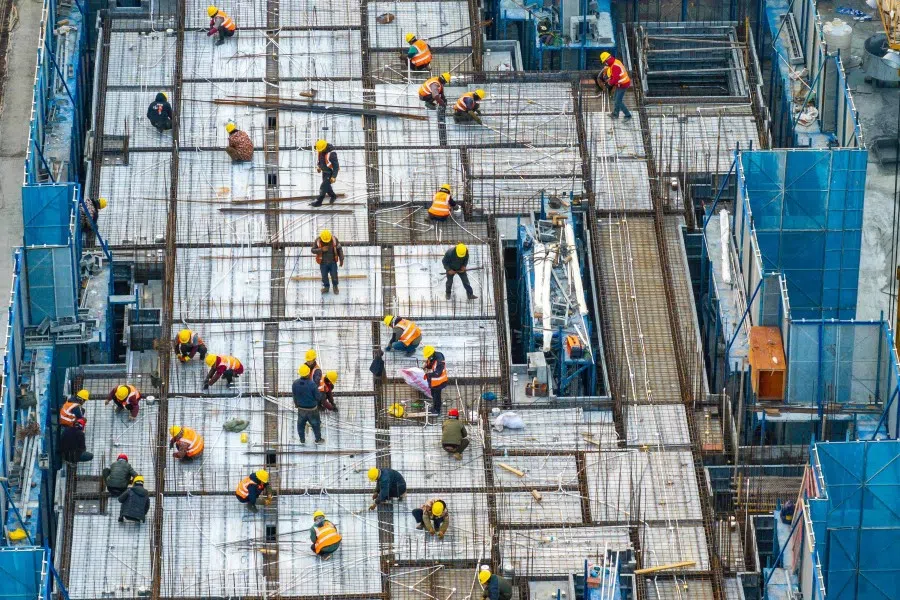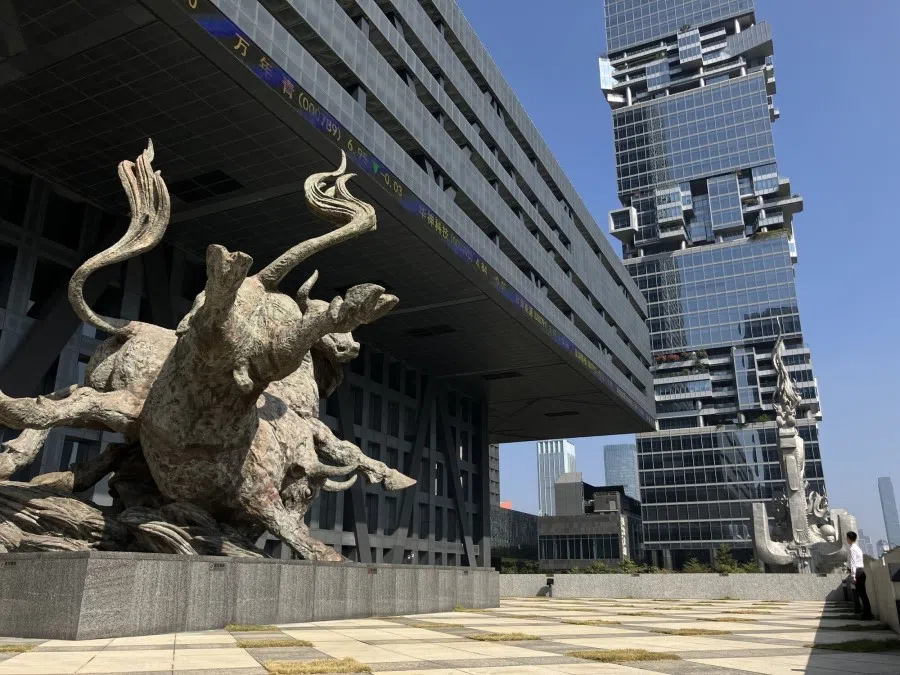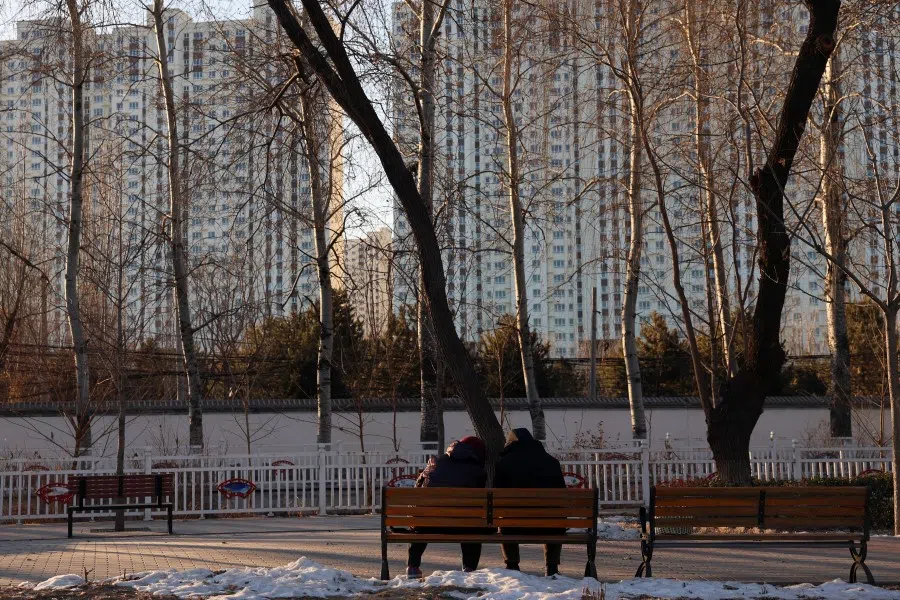The true state of China's economy: Local debt and property market (Part 1)
In part one of his article taking stock of the Chinese economy and assessing bright spots and challenges in 2024, Chinese economist Yao Yang focuses on the key factors of local fiscal difficulties and fundamental adjustments needed for the real estate sector.

The year 2023 was the year China's economy returned to stability and showed encouraging signs despite the many ups and downs.
Strong growth in the first quarter was a great start that calmed nerves that had persisted for some time, but it also raised expectations. The second quarter's data was below expectations and caused some market anxiety. However, the various economic indices showed signs of recovery in the third quarter.
China's GDP growth was 5.2% year-on-year in the first three quarters. Although the fourth quarter's economic data have not all been announced, sentiments and expectations are more stable. (NB: Official data on 17 January showed that China's 4th quarter GDP rose by 5.2% year-on-year.)
Based on each quarter's economic data, there is little doubt that GDP growth in 2023 will be between 5% and 5.5%, and the targets set at the beginning of the year will be met. This will help stabilise market confidence and lay the foundation for China's stable economic growth in 2024. (NB: Official data on 17 January reported that China's overall 2023 growth rate was 5.2%.)
External and internal factors tested China's economy
Although the results are within expectations, the process was gruelling as multiple external and internal factors had impacted the market in 2023.
Globally, overall demand had fallen in the economic downturn, resulting in uncertain market sentiments. New and rapid technological changes brought about more challenges for industrial upgrading and innovation.
Domestically, the problems of local debt were more acute, with the real estate sector yet to bottom out as well as greater pressures on increasing investment and consumption. In a time of market adjustments, some enterprises and individuals may not have felt tangible growth.
... it will take some time for policies and industrial production to take effect. Hence, I predict an upturn and further recovery in China's economy in the second half of 2024.

However, there is no need to worry excessively because even with all its difficulties, China remains one of brightest economic performers in the world in 2023.
The series of curbs by developed nations led by the US failed to halt the development of China's enterprises. In August, the profits of industrial enterprises above designated size in China turned positive. From January to September, China exported 3.4 million cars, surpassing the export volumes of Japan and Germany. Pinduoduo, SHEIN and other enterprises that ventured overseas had also developed rapidly.
In 2023, China's policy adjustments were effective and Chinese enterprises recovered strongly, but it will take some time for policies and industrial production to take effect. Hence, I predict an upturn and further recovery in China's economy in the second half of 2024.
Urgent need to alleviate local fiscal difficulties
2023 was a year of severe local fiscal pressures in China. Local government revenue had stagnated as a result of the persistently weak real estate and land markets. Extreme climate disasters such as rainstorms, floods and typhoons occurred in many places, and post-disaster recovery and reconstruction tasks were heavy burdens locally. Together with the debt burden accumulated over time, it was challenging to increase investment and expand production.
To help local governments tackle these difficulties, the Sixth Session of the 14th Standing Committee of the National People's Congress (NPCSC) voted and passed the resolution by the State Council on 24 October 2023 for the issuance of additional sovereign bonds and adjustments to the 2023 national budget.
Specifically, China issued one trillion RMB (US$138.96 billion) of sovereign bonds in the fourth quarter of 2023 in a special national debt management plan. The additional bonds were allocated to local governments through transfer payment to increase the fiscal deficit from 3.88 trillion RMB to 4.88 trillion RMB as well as increase the deficit ratio from 3% to about 3.8%.
Concurrently, the State Council made advanced arrangements to allow local governments to front-load part of 2024 local bond quotas. Although the specific amount has not been officially disclosed at the time of writing, it is estimated that it would be about 2.7 trillion RMB, according to the NPC's red line to cap it at 60% of the total annual quota.
The issuance of the additional one trillion RMB of sovereign bonds plays an important role in easing local fiscal pressures and improving China's economy.
... the stringent restrictions on local debt resulted in a period of time when local governments could only "borrow new money to repay old debt" and could not secure new funds for infrastructural development, hence inhibiting local government investment.

It is evident in the above proactive fiscal policy that the central government is very determined to stabilise the economy. These measures are hugely effective in tackling local debt risks as well as further enhancing local capabilities, increasing investment, and ensuring and improving lives. Previous disincentives to investment due to tight policies and large local debt burdens were largely alleviated. Only by addressing fiscal difficulties and enabling local governments to operate normally can investment take place and confidence in the economy be restored.
When China emerged from Covid-19 at the start of 2023, the conditions were good for economic recovery and indeed the economy recovered well, resulting in widespread optimism. However, as various data declined in the second quarter, it appeared that the economic recovery did not meet expectations and lacked momentum.
I believe there are two reasons for this situation. First, the past stellar performance has made us somewhat overconfident, resulting in tighter government policies, including the delay of the easing of policies for the real estate industry. Second, the stringent restrictions on local debt resulted in a period of time when local governments could only "borrow new money to repay old debt" and could not secure new funds for infrastructural development, hence inhibiting local government investment.
In recent years, local governments' fiscal difficulties have been commonly heard of. Previously, they might have had no choice but to utilise newly raised funds to ensure daily operations. However, their deficits snowballed over time. Despite being financially stretched, they were unable to raise new money, in addition to declines in land and tax revenues. Together, these factors generated severe downward pressures on the economy.
In July, the central government began to progressively introduce a series of significant support policies. The first was the 1.5 trillion RMB debt repayment plan.
On 24 July, China's Politburo meeting proposed "to effectively prevent and resolve local debt risks by formulating and implementing a debt package". On 28 August, the report by the State Council on budget execution, submitted to the 14th NPCSC, stated that a debt management package plan was to be formulated and implemented to prevent and resolve local governments' debt risks.
After several months, the effects of these policies are gradually showing. For example, since August, enterprise profitability has greatly improved and positive growth has finally resumed.

On 29 August, the executive meeting of the Hunan provincial government passed in-principle the draft work plan to prevent and resolve local debt risks in Hunan province (for review). Hunan was the first province to issue a debt management plan. By mid-October, ten provinces, including Hunan, Inner Mongolia, Tianjin, Liaoning, Yunnan, Chongqing, Guangxi, Qinghai, Jilin and Jiangxi, had announced special refinancing and bond issuance plans to repay existing debts.
It is extremely helpful to allocate funds to provinces and cities with particular fiscal difficulties and let them replace commercial debts by issuing local government bonds, in order to alleviate fiscal pressures.
The proceeds of the subsequent one trillion RMB special sovereign bond issuance were focused on supporting post-disaster recovery and reconstruction, making up for the inadequacies of disaster prevention, mitigation and relief, as well as improving the overall ability to withstand natural disasters.
In addition, the 2.7 trillion RMB local bond quota in 2024 has been front-loaded in 2023. After several months, the effects of these policies are gradually showing. For example, since August, enterprise profitability has greatly improved and positive growth has finally resumed.
Fundamental adjustment needed for the real estate sector
China's economy has achieved the growth targets set at the beginning of 2023. However, based on online comments and the real situation, many enterprises and individuals perceived less cheer.
... one should not fear fluctuations of housing price, especially its decline, because it can only rebound after hitting a trough.
Why is there such a gap? First, market changes require some time for their effects to materialise in corporate profits, personal income and employment. Second, there is the "illusion of shrinking wealth" brought about by the real estate market downturn, as real estate forms an important part of the people's personal wealth.
All this while, China's population has been "schizophrenic" about housing prices. Everyone complains that the housing price is too high and calls for it to rise no further when it keeps increasing, but fervently urges not to let it fall as it will be very undesirable. Often, it is the same person who argues both ways.
A huge misconception is evident in this disapproval regardless of the rise or fall of housing prices. In fact, one should not fear fluctuations of housing price, especially its decline, because it can only rebound after hitting a trough. It is timely for the real estate industry to make adjustments when its problems begin to show up in real estate prices.
In the past few years, many local governments have been stubbornly insisting on not reducing housing prices. Even today, some cities are accused of market disruption as soon as housing prices are reduced. Based on city-specific real estate policies, many cities are currently still restricting purchases. Inevitably, the perception is that real estate policies are always opaque and do not send out clear signals.
On the surface, price reduction seems to be undesirable for homeowners. A 20% to 30% fall implies that personal wealth has shrunk by the same magnitude, which is certainly unfavourable. However, to economists, this is an "illusion of wealth", which is the kind of public opinion that causes people to oppose housing price reductions.
In reality, housing price reduction is not necessarily bad because positive development in the real estate sector will ultimately depend on price changes to regulate expectations. Take Hong Kong for example, housing prices have fallen sharply and at times almost halved during the many financial crises and economic downturns, but it rebounded to even greater heights after three to five years.
I believe that the "fundamental change" is that speculation in real estate is no longer regarded as a source of wealth increase.

The latest decision by the Politburo meeting is that the relationship between supply and demand in China's real estate has fundamentally changed. I believe that the "fundamental change" is that speculation in real estate is no longer regarded as a source of wealth increase.
Hence, real estate policies should normalise to become "neutral". New policies must clearly articulate the future direction and be transparent in implementation. Often, the central government's policies are in the right direction but many details must be improved in implementation.
For example, it is often said that future real estate policies must be market-driven, and that the government will only be responsible for affordable housing. However, great difficulties were encountered in the actual implementation of such policies in the past. Local governments with fiscal difficulties are unable to take the lead to invest because land acquisition and affordable housing development cost money as well.
The debate about affordable housing
Moreover, real estate developers worry about sales upon completion because many affordable housing properties cannot be bought and sold in the market due to current regulations. Affordable housing bought at lower prices cannot be further transacted. This is a waste of money to many, who rent instead.
Perhaps, it remains controversial for affordable housing to be further transacted, but it is entirely conceivable to achieve transactions within its property type, for example by permitting a small appreciation in price. A current affordable housing owner could be allowed to sell the unit to enable a prospective buyer to purchase the unit to facilitate home upgrading.
I predict that this round of adjustment will at most lower housing prices by 30% to 40% to hit the bottom.
For commercial housing, price adjustments are a necessity to regulate buyer sentiments. Like in the stock market, "buy low sell high" works in the property market too. When the actual sales volume of housing is halved with little price adjustment, buyers will definitely adopt a wait-and-see attitude and become bearish. With this sentiment, no one will make a purchase. The longer this stalemate persists, the worse it is for the sector's recovery.
Therefore, if we want the real estate sector to return to normal and allow housing prices to rise and fall in line with market changes, it is necessary to take this opportunity to make a fundamental adjustment, which will enable a bottoming out and a rebound.
I predict that this round of adjustment will at most lower housing prices by 30% to 40% to hit the bottom. Property buyers will make housing purchases when they think that the prices have bottomed out. In fact, China's urbanisation has not ended as there are still large numbers of people who wish to relocate from underdeveloped areas to developed cities as well as large numbers of young people who are not yet home owners and require housing. There is much room for structural adjustments.
This article was first published in Chinese as "经济稳定增长,首先要政策回归常态" on National School of Development, Peking University's Weixin account and Phoenix Weekly.



![[Big read] When the Arctic opens, what happens to Singapore?](https://cassette.sphdigital.com.sg/image/thinkchina/da65edebca34645c711c55e83e9877109b3c53847ebb1305573974651df1d13a)
![[Video] George Yeo: America’s deep pain — and why China won’t colonise](https://cassette.sphdigital.com.sg/image/thinkchina/15083e45d96c12390bdea6af2daf19fd9fcd875aa44a0f92796f34e3dad561cc)
